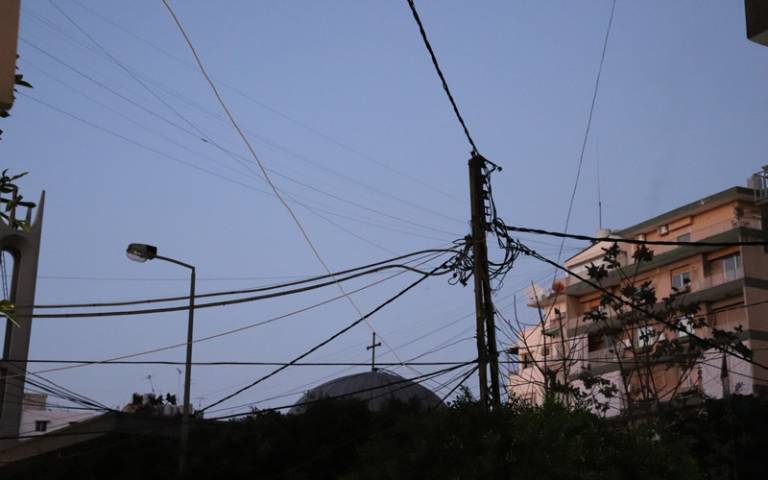IGP/Chatham House workshop: "Transitions to Renewable Energy and Sustainable Prosperity in Lebanon"
25 January 2019, 9:00 am–6:00 pm

The Institute for Global Prosperity, Chatham House and the RELIEF Centre are organising the one-day workshop, "Transitions to Renewable Energy and Sustainable Prosperity in Lebanon: A People-Centred Approach to Equitable Energy Supply", 25th January 2019, at Chatham House.
Event Information
Open to
- All | Invitation Only
Availability
- Sold out
Organiser
-
Annelise Andersen
Location
-
Chatham House10 St James's SquareSt James's SquareLondonSW1Y 4LE
The workshop
This workshop will bring together strategic planners, scholars, and energy practitioners to discuss how we can build a research agenda around people-centred approaches to equitable energy supply in Lebanon. We will ask:
- What are the different community needs in specific contexts and settings in Lebanon? This calls for a deep engagement with people's aspirations while understanding the structural constraints that shape them.
- Do we have the appropriate information to address future energy needs and development? There is a chronic lack of data about energy use and demand in Lebanon, for those in rural areas but also for the urban poor living in rapidly urbanising areas, and in informal settlements especially.
- What is the match between government policies for equitable energy supply and the needs of different communities such as the displaced or the urban poor who reside in informal settlements in rural and urban contexts? What other scale of intervention, e.g. at the municipal level, or the neighbourhood level, are effective when political decentralisation/fragmentation exist?
About
This workshop will consider what choices Lebanon has beyond the traditional top-down structural reforms in energy currently being promoted by the International Monetary Fund and World Bank. This question will be considered in the context of the evolving crisis response and resilience approach currently being taken to energy challenges in Lebanon. With a rapidly changing commercial outlook for both fossil fuels and other energy technologies in the country, it is also timely to consider how Lebanon, as a potential oil and gas producer, can limit its exposure to carbon risk and follow a cleaner pathway to energy through optimised models for energy diversification.
Building on their respective work in the fields of green growth in Lebanon and energy in displacement crises globally, the Institute for Global Prosperity, Chatham House and the RELIEF Centre would like to examine the opportunities, solutions and new research questions that could inform future, bottom-up interventions that have an impact on sustainable future prosperity for Lebanon.
Citizen-led, microscale and decentralised generation experiments in renewable energy, and energy that has co-benefits for waste disposal, are helping rural and urban communities in Lebanon to become more energy resilient by offering a more secure and sustainable energy supply to meet the demands of an increasing population. Equitable energy supply at this local level depends on community involvement in order to be successful, as business models integrate technical concerns with institutional frameworks and user preferences.
We would like to develop research questions that explore new and existing models of energy delivery that recognise people's needs in context; their socio-economic conditions, their perspective and aspirations for achieving their self-defined prosperity.
Chatham House
Chatham House, the Royal Institute of International Affairs, is a world-leading policy institute based in London. Our mission is to help governments and societies build a sustainably secure, prosperous and just world.
It engages governments, the private sector, civil society and its members in open debate and private discussions about the most significant developments in international affairs. Each year, the institute runs more than 300 private and public events - conferences, workshops and roundtables - in London and internationally with partners. Its convening power attracts world leaders and the best analysts in their respective fields from across the globe.
Its research work focuses on independent and rigorous analysis of critical global, regional and country-specific challenges and opportunities.
The RELIEF Centre
The RELIEF Centre is a transdisciplinary research collaboration that focuses on one of the world's most pressing challenges of the moment: how to build a prosperous and inclusive future for communities affected by mass displacement.
The RELIEF Centre's research focuses on how we can measure prosperity and growth in Lebanon - a country that is experiencing a massive displacement of people - moving beyond indices like GDP to include measures of wellbeing, health, employment and education.
It is led by the Institute for Global Prosperity in collaboration with departments in University College London, the American University of Beirut and the Centre for Lebanese Studies.
 Close
Close

